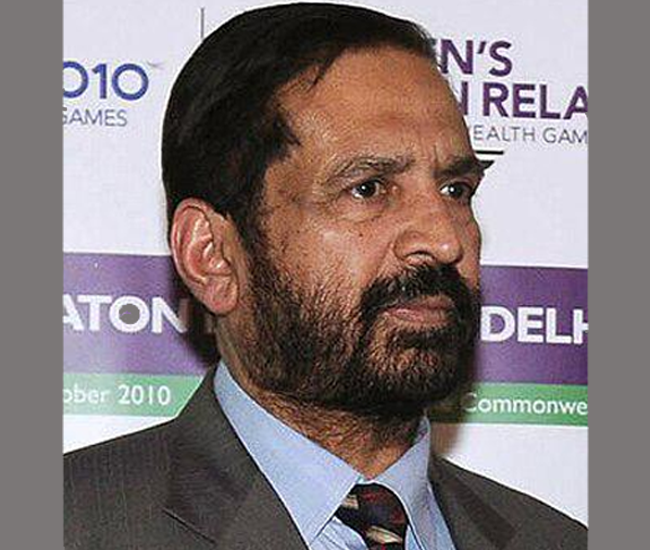
WCH DAY 7 – Kitaguchi wins Japan and Asia’s first gold medal. Rojas snatches last-gasp victory
By A Correspondent
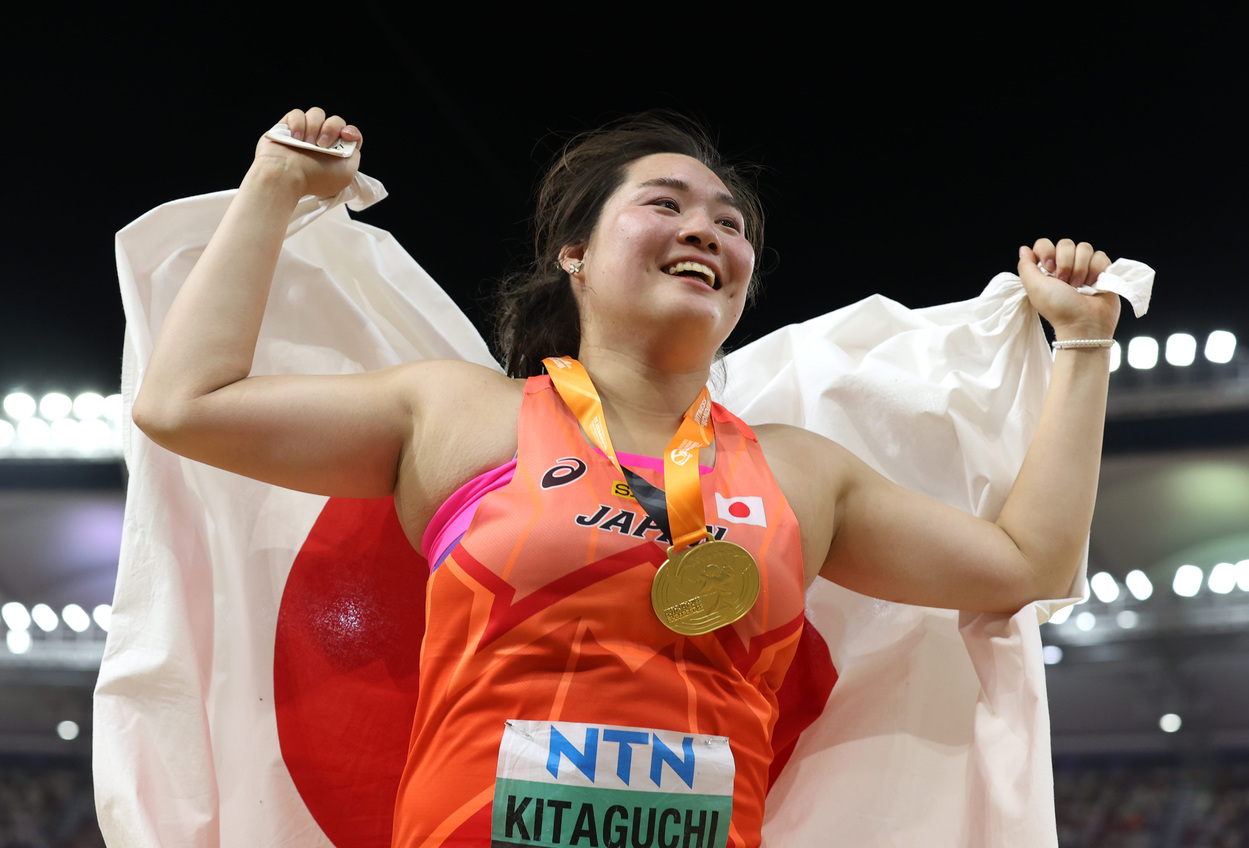
It was another night of come-from-behind victories on Friday just as it was the previous day in the World Athletics Championships at Budapest.
Japanese Haruka Kitaguchi, the 25-year-old javelin bronze medallist from the last World championships, had to produce a magical last-round throw of 66.73m to snatch the gold away from Columbian Denis Ruiz Hurtado who was leading from the first round.
Kitaguchi, the season leader with 67.04m at Chorzow, Poland, in July, was lying fourth till the final round before pulling off one of the thrilling heists of the evening.
It was Japan and Asia’s first gold medal of these championships. In the last edition, Japan had contributed one of Asia’s five gold medals through 20km racewalker Toshikazu Yamanishi, who finished 24th this time.
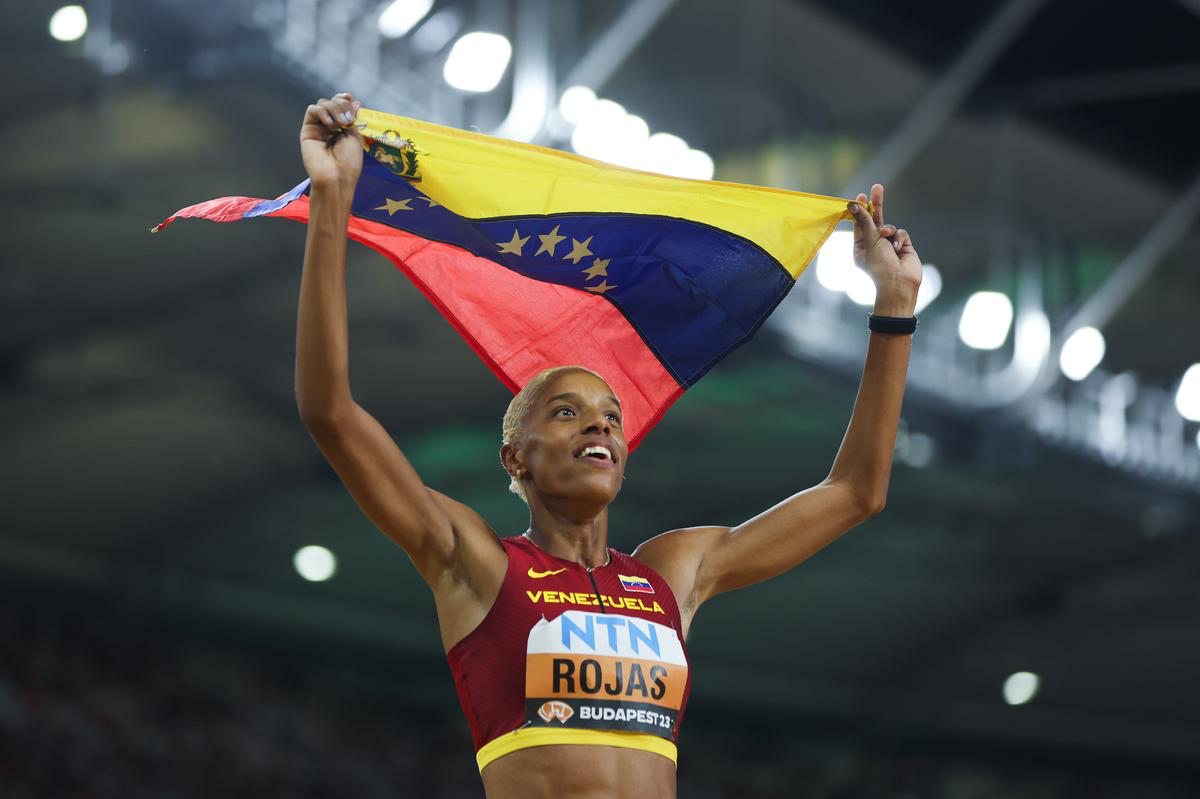
In another great comebacks of the evening, Venezuela’s Yulimar Rojas won her fourth World title in triple jump, hauling herself up from the eighth spot, with a jump of 15.08m.
The evening was not all about comebacks, though. American Noah Lyles “walked the talk” as he effortlessly won his third straight World 200m title, and having won the 100m earlier, became the first World sprint double winner after Jamaican legend Usain Bolt who took it last in 2015.
Another 200m winner on Friday was Jamaican Shericka Jackson who clocked the second fastest women’s longer sprint ever, after Flo Jo’s celebrated 21.34s at the 1988 Seoul Olympics, by coming home in 21.41s, just seven-hundredth of a second off the almost untouchable world record. It was Jackson’s second 200m title in the Worlds.
The Japanese record holder Kitaguchi started off modestly with 61.73m but widened it to 63.00m in the third round of the javelin contest. Furtado’s opening 65m had put the pressure on the rest of the field and it was not easy to come up with one’s best for the rest of the field.
Yet, Kitaguchi strove hard till the end to turn the tables on the rest of the competitors. Among them, champion of the last two editions, Kelsey-Lee Barber of Australia had finished with a 61.19m for the seventh place. She had not been in great touch this season but was still rated high and some tipped her even to claim her third title in a row.
Kitaguchi let out a shriek as she let go of the javelin on her last attempt and saw it landing far. She was jumping around with great excitement as she waited for the scoreboard to flash 66.73m, her second-best throw of the season. The Japanese continued to scream, unable to control her emotions. The first world title, especially after a minor medal in a previous edition, can bring in unexplainable emotions.
Latvia’s Ana Kocina, who was lying second for much of the competition found herself pushed to the bronze status and still later to the fourth spot as Mackenzie Little of Australia came up with a 63.38m, just 20.00cm ahead of the Latvian.
Another Latvian, Lina Muze-Sirma, who had topped the qualification round with 63.50m, could not make the top-eight cut in the final. She had two fouls following her 58.43m in the opening round.
Kitaguchi’s was Japan’s eighth gold medal in the 40-year-old history of the World championships.
“The key thing was to just believe it, not to try to change anything,” said Kitaguchi. “Last year my goal was just to get into the final. This time my goal was (the) gold.”
Olympic champion Liu Shiying of China finished sixth with a season best 61.66m. She had won the silver in the Asian championships at Bangkok last month.
More dramatic in its turn-around was the women’s triple jump contest in which Rojas, the Olympic champion at Tokyo with an outdoor world record of 15.67m, had to claw her way back from a hopeless, uncharacteristic position.
Heavy favorite to win the title, the 31-year-old Rojas could not touch 15.00-metre mark, something routine for her, till the final round which saw her go into gold medal position for the first time in the competition. It stayed there though two of her closest opponents still had an attempt left. Rojas only had a best of 14.33m till then with three fouls. Ukraine’s Maryna Bekh-Romanchuk’s 15.00m opening jump remained the best till the final effort from Rojas.
As she realized she had at last won again, Rojas lay on the turf as the crowd went into applause, relieved that her agony was over. For her rivals, the frustration must have been acute.
“It was very difficult,” said Rojas. “The fact that I won the competition with my last attempt makes it very special and memorable. This is my seventh world title (outdoors and indoors)”, she said.
“After I won the Olympic Games in Tokyo, I said the next day that people in Venezuela would not work because everybody in the country would be celebrating. Well, now it will be more or less the same. I’m going to appear on the front pages everywhere. But more important, I’m going to be in the hearts of all the Venezuelan people.”
European champion Bekh-Romanchuk said: “Maybe people saw my calm, focused and confident face, but believe me nobody knows what I felt deep inside,” she said.
. “Tonight, I just enjoyed my jumps, the whole competition and everything I did. I think Yulimar Rojas also had a difficult season, but I was sure she could jump over 15 metres”
Twenty-one-year-old Perez Hernandez of Cuba (14.96m) who claimed the bronze, said, “I knew that if someone was capable of changing the result at the last minute, it was Yulimar Rojas”.
The Cuban said that even though she won her first medal at the Worlds, she was not satisfied with her performance.
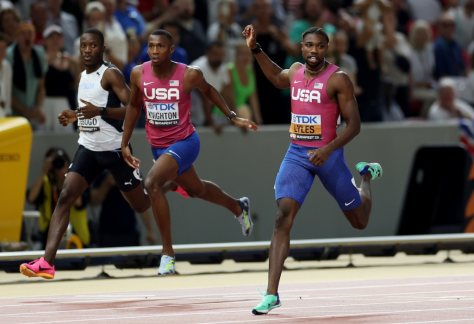
The 200m clashes went as per form and reputation. Lyles, who had taken his first 100m title earlier, much against forecasts that tipped the scales in his American team-mate Fred Kerley’s favour, could not be matched once he broke through to the straight. The American double winner had a 10m split of 10.26s
Closest to Lyles was his countryman, 19-year-old Erriyon Knighton, who did the first 100m in 10.28s but was much slower than Lyles in the second half with 9.47s. Once past the 120-metre mark there was no letting up for Lyles as he crossed in style for 19.52s, short of his expectations and his best for the season, 19.47s, but still good enough for his second gold in the championships.
Botswana’s Letsile Tebogo, the silver winner in the 100m, took the bronze in 19.81s.
“It is a great feeling to know I did something not a lot of people have done,” Lyles said. “In my documentary I talked about wanting it to be done, being different from anybody else, and winning double golds was one of the things on my list. I wanted to show I am different. Today I came out and showed it. I am double champion.
“We have the 4x100m final tomorrow. Team USA did a great job in the qualifications. I am hoping to join the team and grab another gold.”
Knighton commented: “Bronze last year and now silver, so I got a trade up. I got out and tried to run my own way as best I can. I didn’t win the race but I still came home with the supper so I can’t complain.”
“I believe I am a role model for young people in Botswana because there have not been many sprinters from my country,” said Tebogo.
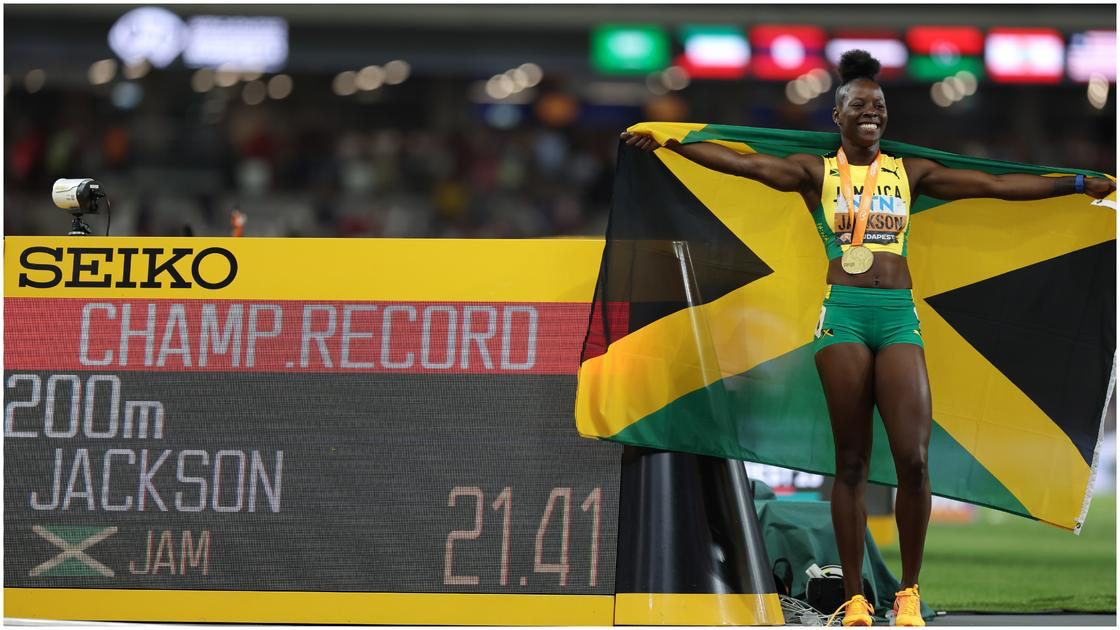
Shericka Jackson unstoppable
Just as with Lyles, there could not be doubts about Shericka Jackson’s superiority in the longer sprint. She was the woman in great form and had the reputation having come down to the pure sprints from the one-lapper with commendable success. Though American Gabby Thomas had the world lead coming into these championships at 21.60s, Jackson had looked formidable.
As it proved, the Jamaican had a comfortable lead coming into the straight, and though Thomas tried her best through the final 40 metres, there could be no stopping Jackson who clocked a world-leading Jamaican national record 21.41s. Sha’Carri Richardson, the American who won the 100m from lane nine, was yet again in the same lane, and she won the bronze in 21.92s
Briton Dina Asher-Smith, the 200m champion from 2019, had another disappointing finish at seventh in 22.34s. She finished ninth in the 100m.
“Yesterday, in the semifinals, I ran the curve a little bit conservatively,” said Jackson, “but I think I did pretty good tonight!
“I ran a good race, 21.41 is a time I cannot complain about. It feels good that even though I used to run 400m I can still do a very good 100m and 200m. I feel like I am a living testimony that you can create something if you really want it and never give up,” said the champion.
Thomas said, “I couldn’t believe it when I looked at the screen afterwards.
“I knew that I was coming in to the final hot, so that was to my advantage,” she said.
“I ran my race and I stayed composed, so I am happy to come out with a silver. To go to Paris for the Olympics would be amazing. I felt so much support in Budapest. I would love to repeat this feeling next year.”
Neeraj Chopra leads three Indians into javelin final
Olympic champion Neeraj Chopra led three Indians into the final of the javelin competition with a season best 88.77m in his opening throw. Joining him were team-mates D. P. Manu (81.31m) and Kishore Kumar Jena (80.55m).
Also moving into the final, with the second-best throw of the day, was Pakistani Arshad Nadeem, with 86.79m.
Champion in the last two editions, Anderson Peters of Grenada was among those who could not make the final. He ended 16th with only 78.49m as against his season best of 85.88m and Area record of 93.07m.
Asian champion Genki Dean of Japan was another athlete who failed to make the “cut”, finishing 14th with 79.29m. In Bangkok he had thrown 83.15m for the gold.
Japanese Kenji Ogura (76.65m) also did not advance.
Photo 1 Credit: https://images.app.goo.gl/SUWUcDVLH26N83ZUA
Photo 2 Credit: https://images.app.goo.gl/NtcxUM4AEpbfKyuV6
Photo 3 Credit : https://images.app.goo.gl/DZbd9LpxkqXTcKNX7
Photo 4 Credit : https://images.app.goo.gl/VXDAfAbxZNT2WKwy6
Comments are closed.

